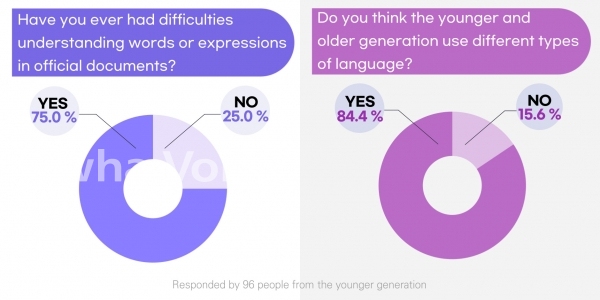
South Korea, ranking one of the most educated countries in the world, has a significantly high literacy rate of 97.97 percent according to a survey conducted by the World Population Review. Having more than 90 percent of the individuals over 15 years old with the ability to read and write, most Koreans are expected to have no difficulties in communication.
However, there was a recent issue around a written apology posted on a webcomic artist’s website regarding the mistake made in the process of signing up for the artist’s autography event. The website used the words ‘심심한 사과’ which were intended to mean that they expressed their sincerest apologies. The issue arose as the expression ‘심심하다’ used alone can also mean ‘boring,’ which confused some users and made them think the organizers of the event were bored of apologizing or being sarcastic about their mistake.
This was not the first time Koreans, especially the younger generation, mistook expressions that could have multiple meanings. This time the issuespread to an intergenerational conflict, as some people from the older generation started to criticize the younger generations’ lack of understanding of the Korean language, with some even pointing out their undesirable attitude of not wanting to accept and learn from their mistakes.
Oh Jeong-a, a Korean language teacher working at a high school in Seoul, shared her thoughts on the issue as well as the current state of the literacy of Korean students, working at the front line of language education.
“Currently teaching Korean Language classes to tenth graders, I realize they lack in vocabulary and literacy,” Oh said. “Thus I spare a lot of time on explaining vocabulary and expressions, and most of the students even have difficulties understanding the explanation itself.”
According to the survey conducted by Ewha Voice from Aug. 29 to Sept. 4, among 96 people in their twenties, 75 percent of the respondents experienced difficulties in understanding words or expressions used in official documents. 84.4 percent of the respondents thought that the language the younger generation used differed from that the older generation used, with the main causes being the increase of media usage and decrease of reading volume.
Professor Lim Dong-hoon from the Department of Korean Language & Literature shared his thoughts on the reason behind why the younger generation has difficulties in understanding certain expressions or vocabulary.
“It is crucial to consider the context and use critical thinking skills to fully understand the text,” Lim said. “I believe the decrease of actual literacy rate is not only a problem for the younger generation, as a lot of people in the older generation lack in these comprehension skills too.”
Lim explained that the type of words usually used differ in age, as social relations and interests change throughout different stages of life. He emphasized the significance of all generations to try to understand each other’s language and consider the conversation partner’s age, rather than simply jumping to conclusions or criticizing other’s language use.
Professor Kwon Soon-hee from the Department of Korean Language Education described this phenomenon as “change in the literacy environment” rather than “lack of literacy,” pointing out to the fact that the younger generation is known to be the “digital natives.”
“The younger generation has the opportunity to experience a larger volume of information through the internet,” Kwon described. “This has made them either to read to ‘understand’ or read to ‘keep’ the information they think is useful, while reading to ‘get rid of’ those they think is useless.”
Kwon also pointed out to that the fast speed of communication in the younger generation has affected the lack of literacy. Not only do the younger people have come to neglect the actual meanings of some vocabulary through the process of deciding the type of information to take in, but the immediate communication provided by social media has caused them to quickly skim the text itself rather than taking time to understand the writer’s intention.
“While the older generation is used to written language, the younger generation is used to spoken language,” Kwon said. “Not only this, but the development of media has changed various parts of language culture, and it is thought to bring more change in the future.”
Kwon criticized that though people have recently become better at consuming information under necessity, they lack in the ability to understand others.
“Making an effort to understand the language of the older generation can also mean to understand the elderly themselves,” Kwon stated. “Simultaneously, the older generation should also try to understand, or at least take in, the recent expressions of the younger generation, for peaceful communication between the two different generations.”

